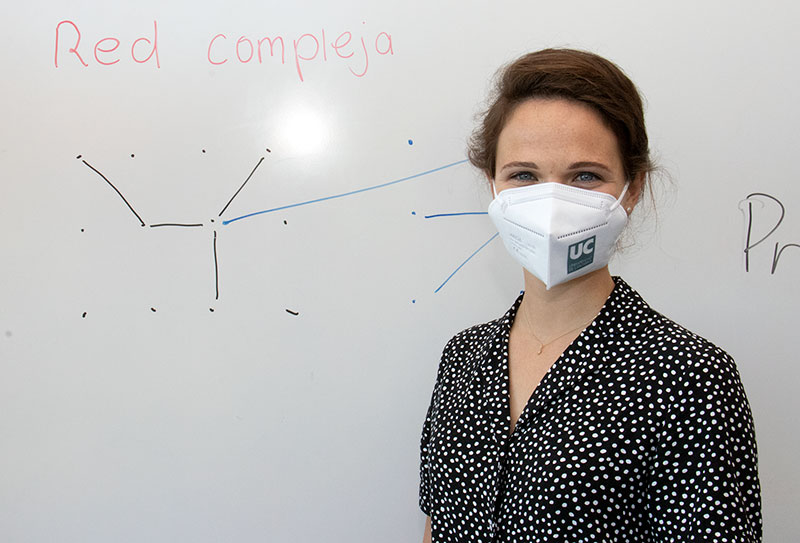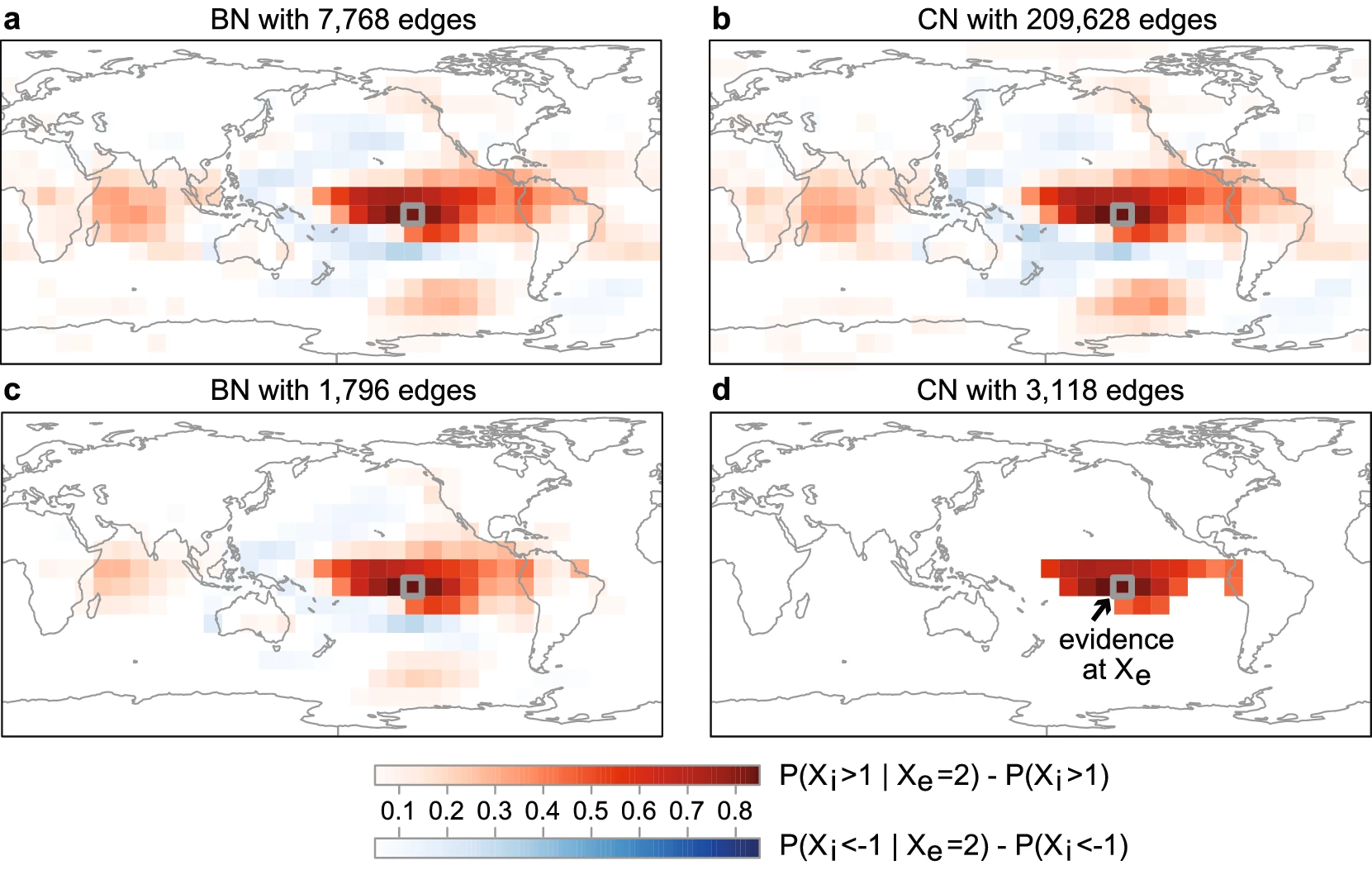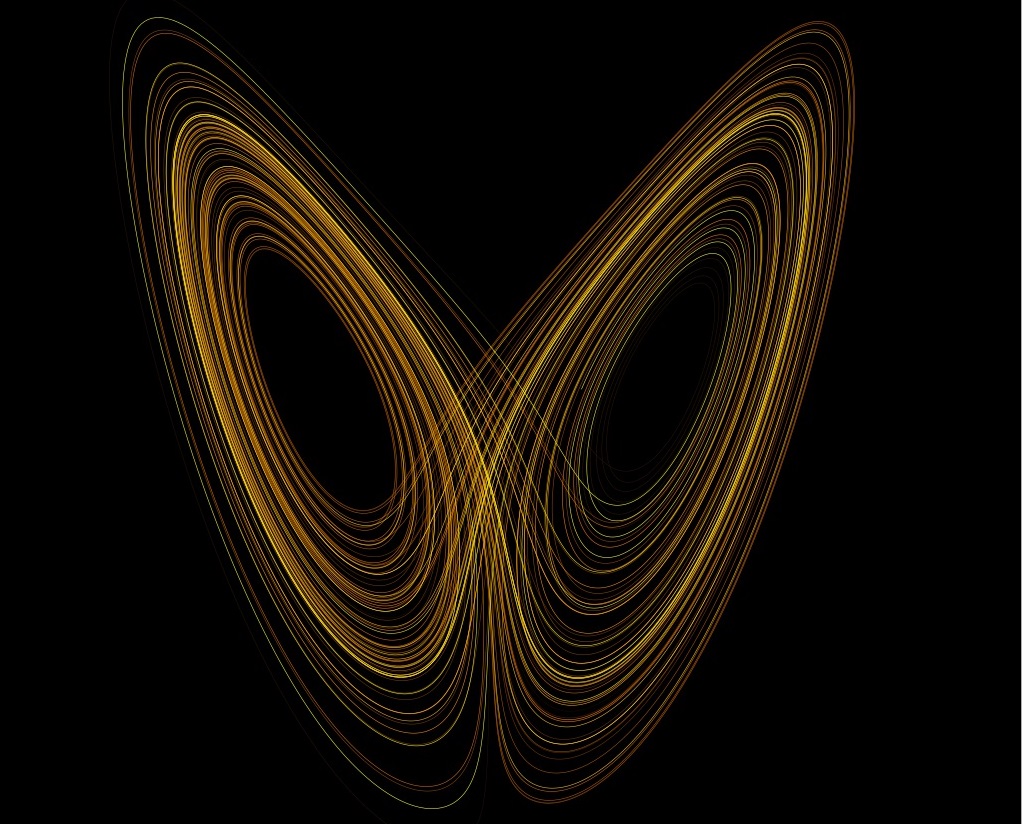Catharina Graafland, a researcher at IFCA working in the same field, comments on the contributions of Manabe, Hasselmann and Parisi
Complex systems "are systems made up of many variables that interact with each other and give rise to emergent processes, whose individual elements cannot be analyzed in isolation, but as a whole". Climate is a paradigmatic example and more specifically phenomena such as 'El Niño', a warming of the Pacific Ocean with consequences in other parts of the world, such as the Indian Ocean or Oceania; a cyclical event that has a great impact on the dynamics of the global climate", explains Catharina E. Graafland, a researcher at IFCA (CSIC-UC).

Catharina E. Graafland explaining what a complex system is/ UC
The Dutch scientist is working on her doctoral thesis at the institute, which focuses on analyzing the vast amounts of climate data available to extract the most important data, using mathematical tools such as complex networks. "These are graphs made up of nodes and links, which allow us to extract fundamental characteristics of a complex system: from something simple we explain something very complex".
These areas of research are topical following the recent presentation of the Report of the Intergovernmental Panel on Climate Change (IPCC), in which IFCA has been heavily involved, and also because of the award last Tuesday of the 2021 Nobel Prize in Physics to scientists Syukuro Manabe, Klaus Hasselmann and Giorgio Parisi. The latter is a theorist of complex systems, an idea he introduced in Physics, and the other two are the fathers of the most important climate models, applied precisely by the IPCC.
The Royal Swedish Academy of Sciences has recognized "their fundamental contributions to our understanding of complex physical systems", including the development of these mathematical models that are making it possible to understand climate change and the responsibility of humans in this global process.

Graph of a climatic phenomenon / Nature
IFCA and Nobel Prize for Physics 2021
The 2021 Nobel Prize in Physics has been awarded to three scientists for "groundbreaking contributions to the understanding of complex physical systems". One half of the prize has gone to Giorgio Parisi for the "discovery of the interplay of disorder and fluctuations in physical systems from the atomic to the planetary scale" and the other half has been awarded jointly to Syukuro Manabe and Klaus Hasselmann "for physical modeling of the Earth's climate, quantifying variability and giving a reliable prediction of global warming". The Nobel Prize is thus for the study of Physics of Complex Systems, a relatively new field. IFCA has a line of research focused on this branch and since 2007, CSIC has a specific institute dedicated to the study of these systems: the Institute for Cross-Disciplinary Physics and Complex Systems (IFISC), a joint center of CSIC and the Universidad de las Islas Baleares.
In a 1999 article, Giorgio Parisi discussed that physicists have recently become interested in studying complex behavior and how the result has been a conceptual revolution. He discussed that in physics word prediction has a fundamental role, but its meaning has changed in the past and continues to change. He refers to three revolutions that have modified that meaning: i) introduction of statistical mechanics, 2) quantum mechanics and 3) the study of complex systems. Parisi argues in the latter revolution the word prediction has a weaker but more general meaning, and how the positive consequence of this are topics under study in physics are now much broader and that constructs (concepts, models, tools) now have many more applications. In fact, an important commonality between two parts of the award is the analysis provided which helps to improve understanding of variability and fluctuations in predictive ability of models.
Going into more detail, Parisi has developed his career at the University of Rome, La Sapienza. He has worked on many aspects of Physics of Complex Systems, to mention a few are phase transitions, the interfaces for which he proposed together with other colleagues the KPZ equation, still today a paradigm in this area, his studies in stochastic resonance and, above all, the solution with symmetry breaking between replicas for equations of glass systems. The latter constitute, as his solution demonstrates, a new phase of matter in which evolution occurs in slow motion, examples being window panes or glaciers, which are actually liquids and continue to flow. The other half of that prize has been awarded for physical modeling of climate and the development of the first climate models. Syukuro Manabe was born in Japan and has worked primarily in the United States. Manabe played a leading role in development of the first climate models in late 1960s and their pioneering use in climate change, projecting response of climate to atmospheric CO2 concentrations.

Image of the Lorentz attractor / Wikipedia
This part of the award has been shared with
Klaus Hasselmann, German by birth and who has developed his career in Hamburg where he founded the Max Planck Institute for Meteorology. Hasselmann contributed to making climate models more robust by analyzing the multiscale interaction between atmosphere and ocean from perspective of Statistical Physics, advancing the understanding of their predictive capacity. Both have contributed to establish physical basis of the climate system and have been pioneers in the development of climate models that are currently used in large international collaborations to develop climate projections under different climate change scenarios.
These projections are the basis for the recent Report of the Intergovernmental Panel on Climate Change (IPCC) Working Group I (physical basis of climate change). With this award, the Academy contributes to reinforcing the scientific soundness of this report on the eve of the decisive COP-26.
With Manabe and Hasselmann contribution, we move from local variables in the sea or atmosphere to evolution of climate of the entire planet and, as indicated by the Swedish Academy itself, Parisi's contributions allow us to understand and describe many phenomena apparently different from each other, not only in Physics, but also in many other different areas such as Mathematics, Biology, Neuroscience and Artificial Intelligence.
José Javier Ramasco Sukia and Maxi San Miguel Ruibal are researchers at the Institute of Interdisciplinary Physics and Complex Systems (IFISC-CSIC-UIB), and José Manuel Gutiérrez Llorente is a researcher at the Institute of Physics of Cantabria (IFCA, CSIC-UC).
Read the article on CSIC website.
